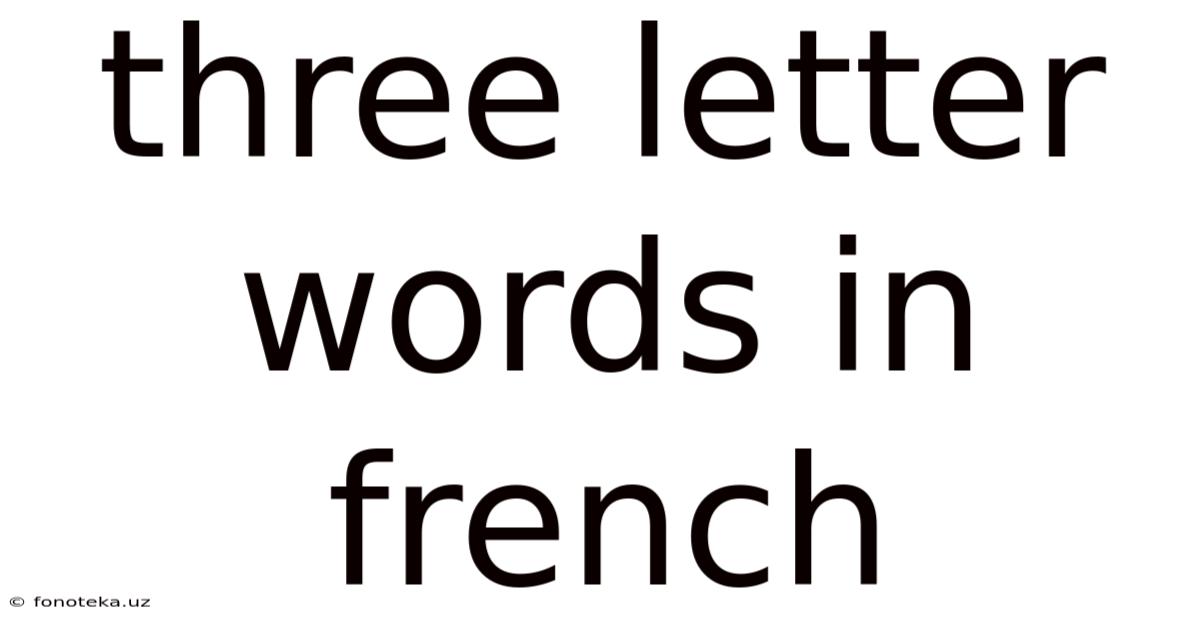Three Letter Words In French
fonoteka
Sep 21, 2025 · 5 min read

Table of Contents
Mastering Three-Letter Words in French: A Comprehensive Guide
French, a language renowned for its elegance and complexity, also boasts a surprising number of short, powerful words. This article delves into the fascinating world of three-letter French words, exploring their common usage, grammatical functions, and providing a valuable resource for learners of all levels. Understanding these foundational words significantly boosts comprehension and fluency, paving the way for more complex sentence structures. We'll cover common three-letter words, their variations, and provide examples to solidify your understanding.
Introduction: Why Three-Letter Words Matter
While seemingly insignificant, three-letter words in French form the backbone of many sentences. They function as articles (le, la, un, une), prepositions (sur, par, en), pronouns (lui, soi, qui), and even verbs (est, est, ait). Mastering these foundational building blocks is crucial for achieving fluency and confidently navigating everyday conversations and texts. This comprehensive guide provides a detailed exploration of these words, categorized for ease of learning and retention. You’ll find examples of how they are used in context, allowing you to build your vocabulary effectively.
Common Three-Letter French Words: A Categorized List
For clarity and effective learning, we've categorized common three-letter French words by their grammatical function.
1. Articles and Pronouns:
- Le: The (masculine singular). Example: Le chat (The cat).
- La: The (feminine singular). Example: La maison (The house).
- Un: A/An (masculine singular). Example: Un garçon (A boy).
- Une: A/An (feminine singular). Example: Une fille (A girl).
- Lui: Him/Her/To him/To her. Example: Je lui parle (I speak to him/her).
- Qui: Who/That/Which. Example: Qui est-ce? (Who is it?)
- Ses: His/Her/Its (plural). Example: Ses livres (His/Her/Its books).
Note: While "des" (some/any) is technically a three-letter word, it's a contraction of "de les" and functions differently than the others in this category.
2. Prepositions:
- Sur: On/Above/Upon. Example: Le livre est sur la table (The book is on the table).
- Par: By/Through. Example: Je vais par la rue (I go through the street).
- En: In/At/To/On (indicates a period of time or means of transportation). Example: En France (In France), En voiture! (In the car!).
- Non: No/Not. Example: Non, merci (No, thank you).
3. Verbs:
- Est: Is/Are (3rd person singular of être - to be). Example: Il est grand (He is tall).
- Ait: May/Might have (subjunctive form of avoir - to have). Example: Qu'il ait raison! (May he be right!).
4. Conjunctions and Interjections:
- Oui: Yes. Example: Oui, je comprends (Yes, I understand).
- Pas: Not (used with ne to form negation). Example: Je ne sais pas (I don't know).
- Que: That/Than/What/Which. Example: Je sais que tu es fatigué (I know that you are tired).
Expanding Your Three-Letter Vocabulary: Variations and Context
The above list represents some of the most common three-letter words. However, their meaning and usage can subtly shift depending on context. Consider these examples:
-
"à": While not three letters itself, when paired with other words or articles (like 'au', 'aux', 'du'), they become key parts of conversational French.
-
Contractions: As noted with "des," many contractions and elisions combine words to create new, shorter forms. Understanding these is vital.
-
Verb Conjugations: The limited three-letter verbs primarily demonstrate parts of their conjugation. Knowing the full conjugation is crucial for proper usage.
-
Regional Variations: Minor variations in pronunciation and even spelling might exist across different French-speaking regions.
Practical Application: Sentence Construction with Three-Letter Words
Let's illustrate how these three-letter words work together in simple sentences:
- Un chat est sur la table. (A cat is on the table.)
- Qui est là? (Who's there?)
- Je lui donne un livre. (I give him/her a book.)
- Non, je ne suis pas fatigué. (No, I'm not tired.)
- En France, il fait beau. (In France, the weather is beautiful.)
These sentences demonstrate how these seemingly small words form the core structure of meaningful phrases.
Beyond the Basics: Exploring More Advanced Usage
Beyond the straightforward examples, many three-letter words appear in idiomatic expressions and more complex grammatical structures. For instance:
- "Pas mal": This literally means "not bad" and is frequently used to express something is quite good or decent.
- "Plus": Though not strictly three letters, it frequently appears in conjunction with other three letter words to create stronger emphasis.
Frequently Asked Questions (FAQ)
-
Q: Are there any other less common three-letter words in French? A: Yes, while the list provided covers the most frequent, several less common words exist depending on context and archaic usage. A comprehensive dictionary would provide a more exhaustive list.
-
Q: How can I improve my retention of these words? A: Consistent practice is key. Try writing sentences, creating flashcards, and engaging in conversations using these words.
-
Q: Are these words crucial for understanding more complex French? A: Absolutely! A strong foundation in these basic words significantly eases understanding of more advanced grammar and vocabulary.
Conclusion: Unlocking Fluency Through Foundational Words
Mastering three-letter words in French is not just about memorizing a short list; it's about building a strong foundation for fluency. By understanding their various grammatical functions and usage in different contexts, you unlock a significant portion of the language’s core structure. Through consistent practice and engagement with the language, these seemingly small words will become powerful tools in your journey towards French fluency. Remember, learning a language is a journey, and these small steps lay a solid foundation for success. Continue to build upon this knowledge, and you will find yourself communicating effectively in French in no time. Bon courage! (Good luck!)
Latest Posts
Related Post
Thank you for visiting our website which covers about Three Letter Words In French . We hope the information provided has been useful to you. Feel free to contact us if you have any questions or need further assistance. See you next time and don't miss to bookmark.